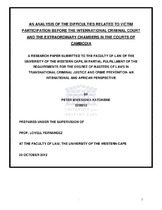| dc.description.abstract | By any standard, victim participation is a relatively new phenomenon in international criminal law proceedings. Incredible advances have been made in the effort to end impunity for crimes against umanity, war crimes, genocide and, more recently, aggression. As a result, great strides have been made in ensuring the direct participation of victims of grave violations of human rights in court proceedings against their perpetrators. Prior to this, grave violations of human rights committed during conflicts or periods of mass violence were either largely ignored or even if action was taken, victims of the crimes hardly had a ‘say’ in the proceedings. With the advent of the International Criminal Court (ICC) and the Extraordinary Chambers in the Courts of Cambodia (ECCC) new dawn in the proceedings of international criminal law has emerged. The statutes that govern the ICC and ECCC have given a voice to victims in court proceeding buy ensuring victims participation.Despite these advances, scholars have criticized victim participation for being inconsistent in its application at the International Criminal Court.1 The criticism has come from scholars who have highlighted the unintended consequences of victim participation in court proceedings, arguing that their participation has resulted in the under- or misrepresentation of the actual experience of survivors of war, mass violence, or repression. These problems have arisen largely because the need to establish the guilt or innocence of the accused and to protect their due process rights, to abide by the rules of evidence and procedure, and to conserve judicial resources all cut against victim-witnesses'ability to tell their stories at these tribunals thereby resulting in a limited, and sometimes inaccurate, record of victims' experience. | en_US |

